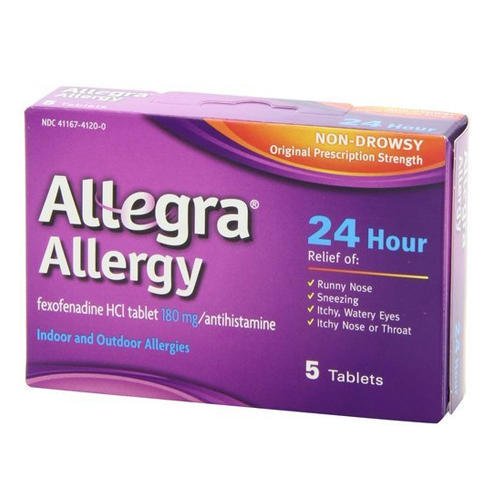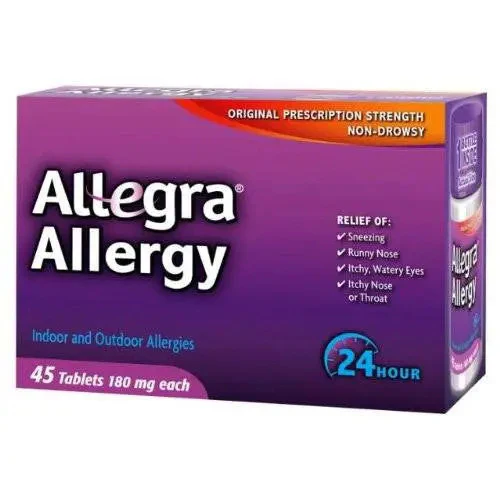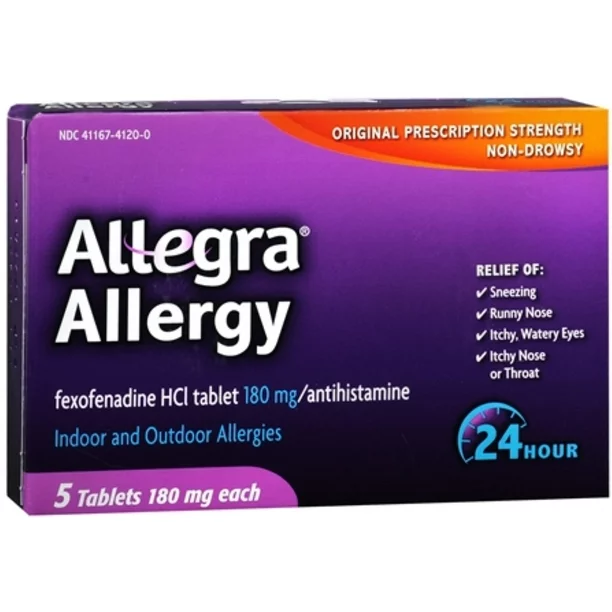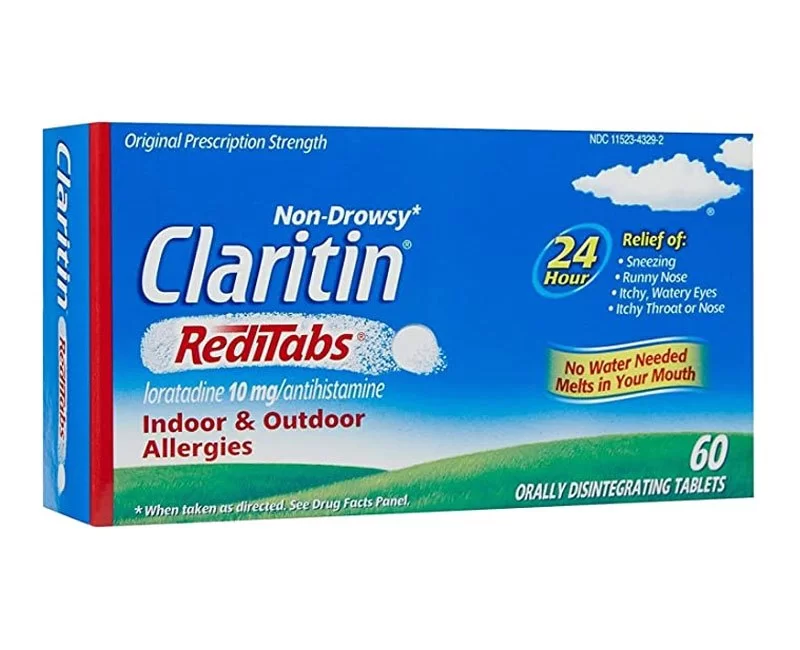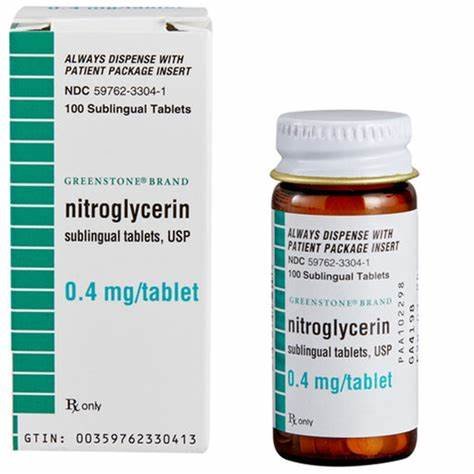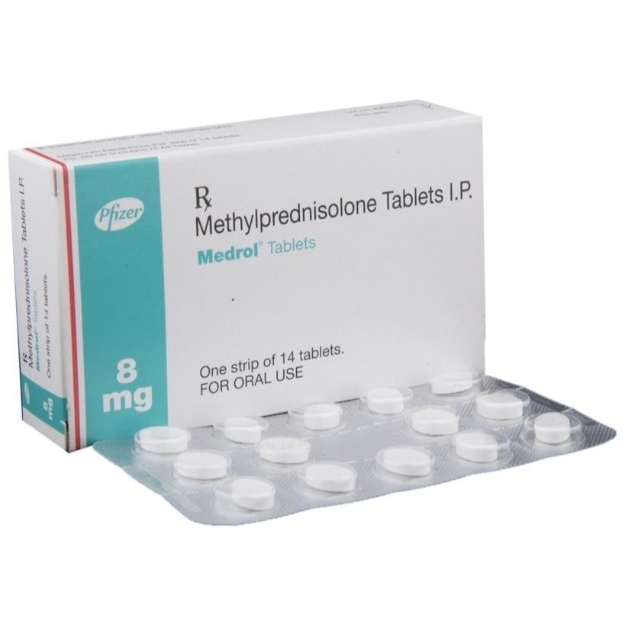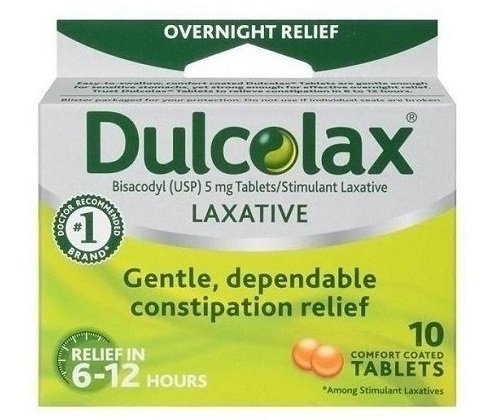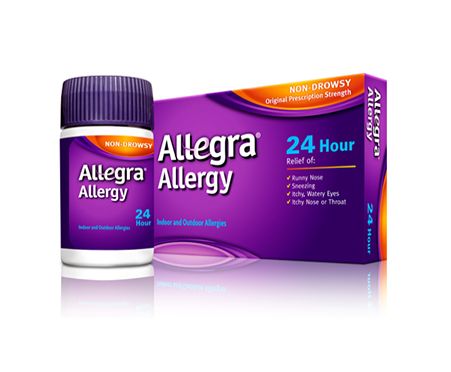
Allegra
Allegra - 180mg
| Product | Per Pill | Savings | Per Pack | Order |
|---|---|---|---|---|
| 60 pills | $0.79 | $47.22 | Buy Now | |
| 90 pills | $0.59 | $17.85 | $70.83 $52.98 | Buy Now |
| 120 pills | $0.49 | $35.70 | $94.44 $58.74 | Buy Now |
| 180 pills | $0.39 | $71.40 | $141.66 $70.26 | Buy Now |
| 270 pills | $0.32 | $124.94 | $212.48 $87.54 | Buy Now |
| 360 pills | $0.29 | $178.49 | $283.31 $104.82 | Buy Now |
Allegra - 120mg
Overview of Allegra
General Introduction
Allegra, known by its generic name fexofenadine, is an antihistamine medication used to treat allergy symptoms such as sneezing, runny nose, itchy or watery eyes, and itching of the throat or nose. It is commonly prescribed for conditions like seasonal allergic rhinitis (hay fever) and chronic idiopathic urticaria (hives). Allegra works by blocking histamine, a substance in the body that causes allergic symptoms. It is available in various forms, including tablets, orally disintegrating tablets, and oral suspension, providing flexibility in administration based on patient needs.
History of Development and Approval
Fexofenadine was developed as a successor to terfenadine, another antihistamine, to provide effective allergy relief without significant drowsiness. Allegra received approval from the U.S. Food and Drug Administration (FDA) in 1996 for treating seasonal allergic rhinitis and chronic idiopathic urticaria. Since its introduction, Allegra has become a popular choice for allergy sufferers due to its efficacy and favorable safety profile.
Key Benefits
Allegra offers several key benefits for patients with allergies:
- Effective Allergy Relief: Reduces symptoms such as sneezing, runny nose, and itchy eyes.
- Non-Drowsy Formula: Provides allergy relief without causing significant drowsiness, making it suitable for daytime use.
- Long-Lasting Relief: Offers 24-hour symptom control with once-daily dosing.
- Multiple Formulations: Available in tablets, orally disintegrating tablets, and oral suspension for flexible administration.
Unique Properties
Allegra is unique due to its ability to provide effective allergy relief without causing the sedative effects commonly associated with first-generation antihistamines. Its selective action on peripheral histamine receptors minimizes central nervous system penetration, thereby reducing the risk of drowsiness and sedation.
Comparison with Similar Medications
Compared to other antihistamines, Allegra offers distinct advantages:
- Non-Drowsy Formula: Unlike some antihistamines, Allegra does not cause significant drowsiness.
- Rapid Onset of Action: Provides quick relief from allergy symptoms.
- Long-Lasting Effect: Offers 24-hour symptom control with a single daily dose.
- Versatile Formulations: Available in various forms to suit different patient preferences and needs.
Safety and Tolerability
Allegra is generally well-tolerated when used as directed. Common side effects include headache, nausea, and dizziness. Serious side effects are rare but may include severe allergic reactions. Regular monitoring by a healthcare provider is recommended, especially during the initial phase of treatment, to ensure patient safety and optimal therapeutic outcomes.
Indications for Use
Diseases and Conditions Treated
Allegra is prescribed for:
- Seasonal Allergic Rhinitis (Hay Fever): Effective in reducing symptoms such as sneezing, runny nose, and itchy or watery eyes.
- Chronic Idiopathic Urticaria (Hives): Helps alleviate symptoms such as itching and the formation of hives.
Symptoms Indicating Use
Patients experiencing symptoms of seasonal allergies, such as sneezing, runny nose, and itchy or watery eyes, may benefit from Allegra. It is particularly effective for individuals who require non-drowsy allergy relief to maintain their daily activities.
Dosage and Administration
Recommended Dosage for Adults
The typical dose of Allegra for adults with seasonal allergic rhinitis or chronic idiopathic urticaria is 180 mg taken once daily. Alternatively, a dose of 60 mg taken twice daily may be recommended. The exact dosage should be determined by a healthcare provider based on the severity of symptoms and the patient's response to therapy.
Dosage for Children
For children aged 6 to 11 years, the recommended dose is 30 mg taken twice daily. For children aged 2 to 11 years, the recommended dose of oral suspension is 30 mg taken twice daily. Pediatric dosing should always be determined by a healthcare provider to ensure safety and efficacy.
Dosage for Elderly Patients
Elderly patients may require dose adjustments based on their overall health and kidney function. Lower doses are often recommended to minimize the risk of side effects such as dizziness and headache. Regular monitoring is important to ensure the medication’s effectiveness and safety.
Optimal Timing of Administration
Allegra should be taken with water and can be administered with or without food. Consistent timing of administration helps maintain stable blood levels of the medication and enhances its effectiveness.
Frequency of Administration
Allegra is typically administered once daily for 24-hour symptom relief. Adhering to the prescribed frequency ensures the medication's effectiveness and minimizes the risk of missed doses.
Impact of Food on Efficacy
Food does not significantly impact the efficacy of Allegra. However, it is recommended to avoid taking Allegra with fruit juices, as they can reduce the absorption of the medication and decrease its effectiveness.
Pharmacological Action
Mechanism of Action
Fexofenadine, the active ingredient in Allegra, works by selectively blocking peripheral H1 histamine receptors. By preventing histamine from binding to these receptors, Allegra reduces the symptoms of allergic reactions, such as itching, swelling, and mucus production.
Molecular and Cellular Targets
Fexofenadine targets peripheral H1 histamine receptors in various tissues, including the nasal passages, eyes, and skin. By blocking these receptors, it inhibits the effects of histamine, a substance released during allergic reactions that causes symptoms such as itching, swelling, and increased mucus production.
Metabolic Pathways
Fexofenadine is primarily eliminated from the body unchanged through the feces, with a small portion excreted in the urine. Unlike some other antihistamines, fexofenadine is not extensively metabolized by the liver, reducing the potential for drug interactions.
Biochemical Changes
By blocking H1 histamine receptors, Allegra reduces the release of inflammatory mediators and decreases the symptoms of allergic reactions. This biochemical change helps manage symptoms such as sneezing, itching, and watery eyes.
Physiological Effects
The physiological effects of Allegra include reduced nasal congestion, decreased itching and tearing of the eyes, and overall improvement in allergy symptoms. Patients may experience enhanced comfort and a reduction in allergy-related disruptions to their daily activities.
Composition
Active Ingredient
The active ingredient in Allegra is fexofenadine hydrochloride. It is available in various strengths, including 30 mg, 60 mg, and 180 mg tablets, as well as 30 mg/5 mL oral suspension.
Inactive Ingredients
Inactive ingredients in Allegra tablets may include microcrystalline cellulose, pregelatinized starch, croscarmellose sodium, and magnesium stearate. These ingredients help in the formulation and stability of the medication, ensuring that it is effective and safe for patient use.
Role of Each Component
Fexofenadine hydrochloride acts as the primary therapeutic agent, while inactive ingredients ensure proper formulation, stability, and absorption of the medication. The inactive ingredients also contribute to the tablet’s integrity and ease of administration.
Side Effects
Common Side Effects
Common side effects of Allegra include:
- Headache: Mild to moderate headache.
- Nausea: Feeling of wanting to vomit.
- Dizziness: Feeling lightheaded or unsteady.
- Dry Mouth: Reduced saliva production leading to dry sensation in the mouth.
Rare Side Effects
Rare side effects may include:
- Fatigue: General feeling of weakness.
- Insomnia: Difficulty falling or staying asleep.
- Back Pain: Mild to moderate back pain.
Serious Side Effects
Serious side effects requiring immediate medical attention include:
- Severe Allergic Reactions: Symptoms such as difficulty breathing, swelling of the face, lips, or tongue.
- Severe Dizziness: Significant lightheadedness or fainting.
- Chest Pain: Pain or discomfort in the chest area.
Frequency and Severity
Most side effects are mild and transient, occurring primarily during the initial phase of treatment. Serious side effects are rare but warrant close monitoring by a healthcare provider. Regular follow-up appointments can help manage and mitigate these risks.
Prevention of Side Effects
General Precautions
To minimize side effects, patients should follow the prescribed dosage and avoid taking more than the recommended dose. It is important to inform the healthcare provider of any existing medical conditions and medications being taken, particularly those that may interact with Allegra.
Recommendations for Better Tolerability
Using Allegra as directed and maintaining regular follow-up appointments with a healthcare provider can improve tolerability. Patients should be educated on the importance of adhering to the prescribed treatment regimen and monitoring their response to the medication. Staying hydrated and avoiding activities that require alertness if experiencing dizziness can also help reduce side effects.
Contraindications
Conditions and Diseases
Allegra is contraindicated in patients with:
- Known Hypersensitivity: To fexofenadine or any of its components.
- Severe Renal Impairment: May require dose adjustments or alternative treatments.
- Pregnancy and Lactation: Should be used with caution and under the guidance of a healthcare provider.
Explanation of Contraindications
Fexofenadine may exacerbate certain conditions, such as severe renal impairment, due to its excretion pathways. Hypersensitivity reactions can cause severe allergic responses, making it crucial to assess a patient’s medical history before prescribing Allegra.
Warnings and Precautions
Potential Risks
Patients should be monitored for signs of severe allergic reactions, dizziness, and chest pain, particularly during the initial phase of treatment. Regular follow-up appointments and communication with a healthcare provider are essential to ensure safe use.
Safety Measures
Regular monitoring by a healthcare provider, starting with a low dose, and adjusting as needed can help mitigate risks. Patients should be instructed to report any symptoms of severe allergic reactions, dizziness, or chest pain immediately.
Missed Dose
Immediate Actions
If a dose is missed, take it as soon as remembered unless it is almost time for the next dose. Do not double the dose to catch up. Continue with the regular dosing schedule to maintain consistent blood levels of the medication.
Preventive Strategies
Using reminders and keeping a consistent schedule can help prevent missed doses. Patients can set alarms, use medication reminder apps, or keep a medication diary to track their doses, ensuring adherence to the treatment regimen.
Drug Interactions
Interacting Medications
Allegra may interact with various medications, including:
- Antacids: Such as aluminum or magnesium hydroxide, which can reduce the absorption of fexofenadine.
- Ketoconazole: Increases the plasma concentration of fexofenadine.
- Erythromycin: Increases the plasma concentration of fexofenadine.
- Fruit Juices: Such as orange, apple, and grapefruit juices, which can reduce the absorption of fexofenadine.
Effects of Interactions
These interactions can affect the metabolism and efficacy of Allegra or the concomitant medications. For instance, combining Allegra with antacids can reduce its absorption and effectiveness. Monitoring for side effects and adjusting dosages may be necessary to manage these interactions.
Avoiding Interactions
Inform the healthcare provider of all medications being taken to avoid potential interactions. Patients should not start, stop, or change the dosage of any medicines without their healthcare provider’s approval. Regular reviews of medication regimens can help identify and manage potential interactions.
Overdose
Symptoms of Overdose
Symptoms of overdose may include severe dizziness, dry mouth, and drowsiness. Seek emergency medical help if an overdose is suspected.
Immediate Actions
Seek emergency medical help if an overdose is suspected. Supportive measures and symptomatic treatment are recommended. Activated charcoal may be administered if the overdose is recent, and intravenous fluids may be given to maintain hydration and support cardiovascular function.
Pharmacokinetics
Absorption
Fexofenadine is rapidly absorbed from the gastrointestinal tract, with peak plasma concentrations reached within 1 to 2 hours after oral administration. The bioavailability of fexofenadine is approximately 33%.
Distribution
Fexofenadine is widely distributed throughout the body and is extensively bound to plasma proteins. It does not cross the blood-brain barrier significantly, reducing the risk of central nervous system side effects.
Metabolism
Fexofenadine is minimally metabolized by the liver and is primarily eliminated unchanged through the feces, with a small portion excreted in the urine. The half-life of fexofenadine is approximately 14 hours, allowing for once-daily dosing.
Elimination
The half-life of fexofenadine is approximately 14 hours, allowing for effective symptom relief with once-daily dosing. It is excreted primarily in the feces as unchanged drug, with a small portion excreted in the urine.
Dosage Forms
Available Forms and Dosages
Allegra is available in tablet form (30 mg, 60 mg, and 180 mg), orally disintegrating tablets (30 mg), and oral suspension (30 mg/5 mL). These various forms and dosages allow for flexible and tailored treatment approaches based on patient needs and tolerability.
Benefits of Different Forms
The availability of multiple strengths and formulations of Allegra makes it suitable for various patient preferences and clinical situations. Different formulations allow for precise dosing adjustments based on therapeutic response and individual patient needs.
Pregnancy and Breastfeeding
Safety During Pregnancy
Allegra should be used during pregnancy only if the potential benefit justifies the potential risk to the fetus. There is limited data on the use of Allegra in pregnant women, and animal studies have shown adverse effects on the fetus. Pregnant women should discuss the potential risks and benefits with their healthcare provider before starting treatment.
Safety During Breastfeeding
Fexofenadine is excreted in human milk. Due to the potential for adverse reactions in nursing infants, a decision should be made whether to discontinue breastfeeding or discontinue the drug, considering the importance of the drug to the mother. Breastfeeding mothers should consult their healthcare provider to weigh the potential risks and benefits.
Storage Conditions
General Recommendations
Store Allegra at room temperature between 20°C to 25°C (68°F to 77°F). Keep the medication in its original container, tightly closed, and out of reach of children and pets.
Specific Storage Instructions
Allegra tablets and oral suspension should be stored in a cool, dry place away from direct sunlight and moisture. Store according to the manufacturer’s instructions to protect the medication from light and moisture.
Expiry and Stability
Check the expiration date on the package and do not use Allegra past the expiration date. Proper storage ensures the medication remains effective and safe to use. Dispose of expired or unused medication according to local regulations to prevent accidental exposure or misuse.
Clinical Trials and Efficacy
Overview of Clinical Studies
Allegra has undergone extensive clinical trials to evaluate its safety and efficacy in treating seasonal allergic rhinitis and chronic idiopathic urticaria. These studies included randomized, double-blind, placebo-controlled trials involving thousands of patients worldwide.
Results and Findings
Clinical trials have shown that Allegra effectively reduces symptoms of seasonal allergic rhinitis and chronic idiopathic urticaria. Patients treated with Allegra demonstrated significant improvements in symptom control and overall allergy relief compared to those receiving a placebo.
Comparative Studies
Studies comparing Allegra with other antihistamines have shown that Allegra provides effective symptom relief with a favorable safety profile. Its non-drowsy formula and long-lasting effect make it a preferred choice for many healthcare providers.
Conclusion
Summary of Key Points
Allegra is an effective antihistamine medication for the treatment of seasonal allergic rhinitis and chronic idiopathic urticaria. Its ability to provide non-drowsy allergy relief and long-lasting symptom control provides significant therapeutic benefits for patients with these conditions. The medication is generally well-tolerated, with a well-documented safety profile.
Recommendations
For optimal results, patients should follow their healthcare provider’s instructions regarding dosage and administration. Regular monitoring and follow-up appointments are essential to ensure the medication’s effectiveness and manage any side effects. Patients should avoid taking Allegra with fruit juices and inform their healthcare provider of all medications being taken to avoid potential interactions.
Final Thoughts
Allegra significantly improves the quality of life for patients suffering from seasonal allergies and chronic idiopathic urticaria by effectively managing symptoms and providing non-drowsy relief. With its proven efficacy and safety, Allegra remains a trusted choice for healthcare providers and patients in the management of these conditions.
